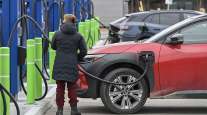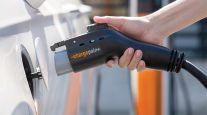Bloomberg News
SPAC Boom Propels EV Makers to Public Markets
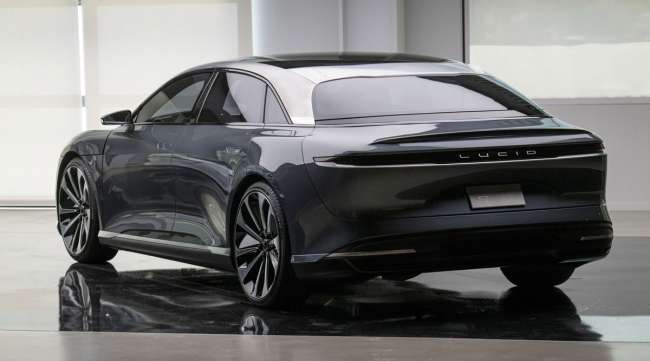
[Ensure you have all the info you need in these unprecedented times. Subscribe now.]
Until June last year, Tesla Inc. was the only dedicated electric carmaker based in the U.S. on the stock market. Then special purpose acquisition companies took over Wall Street.
SPACs, or blank-check companies, are shell vehicles that raise money to take a private company public via a reverse merger. Unlike traditional initial public offerings, SPAC deals allow listing candidates to market financial projections to investors, a perk for earlier-stage companies that have yet to prove their business model.
Electric vehicle companies, many of which are yet to launch commercial products, have taken advantage of that. Nikola Corp. was the first high-profile one to go public via a SPAC listing, followed by others including Lordstown Motors Corp., Fisker Inc. and Canoo Inc.
EVgo Services LLC, a charging network for electric vehicles powered by renewable energy, agreed on Jan. 22 to go public through a merger with Climate Change Crisis Real Impact I Acquisition Corp., confirming a Bloomberg News report.
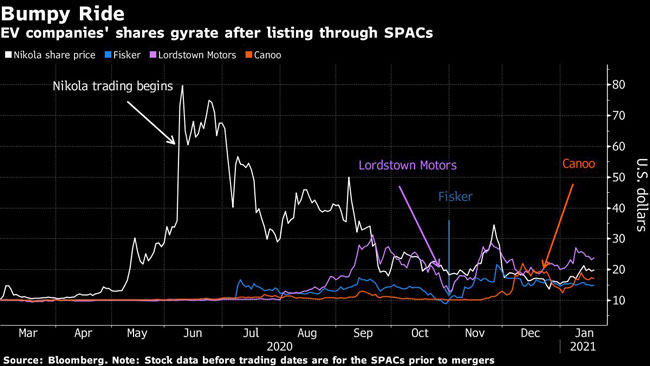
These transactions have captured retail investors’ imaginations and shares often soar when deals are announced or reported. Shares of Churchill Capital Corp. IV are up more than 30% since a Bloomberg News report that its in talks with Lucid Motors Inc.
Despite the apparent ease with which many unproven — and often pre-production — companies have raised funds, there still are concerns about how successfully they can implement their business plans.
“I think a number of these companies that have gone public in the last six months, via these SPACs, are going to run into both financial and operational issues in 2021 and 2022,” former Ford Motor Co. CEO Mark Fields — who’s now a senior adviser at TPG Capital — said at a virtual conference with trade publication Automotive News on Jan. 14. Those challenges could put off both investors and potential strategic partners.
The rocky reputation of SPACs — formerly backwater financial vehicles that have boomed in popularity in recent months — also could be a hurdle to success, according to a report this week from researcher Pitchbook, which tracks investments in private companies. While some public market investors have adjusted their mindset on SPACs, automotive industry participants and potential corporate partners remain skeptical, the report says, which could tarnish the perception of EV companies that go public via that route.
“Historically, SPAC IPOs have been regarded as a back-door route to liquidity, favored by companies with lackluster financials,” Pitchbook Senior Analyst Asad Hussain wrote.

Sustainable trucking is here. In this episode, we'll talk to two major players in the transportation technology sector that are helping fleets move closer to total supply chain sustainability. Hear a snippet, above, and get the full program by going to RoadSigns.TTNews.com.
With $100 billion of SPAC dollars chasing transactions, here are some of the mobility-related companies to watch:
Lucid Motors
Newark, Calif.-based Lucid aims to start production in the second quarter on a $169,000 luxury battery-electric sedan called the Air, which it says can do more than 500 miles on a single charge and will have more than 1,000 horsepower. The company is closely followed, partly because CEO Peter Rawlinson was chief engineer on Tesla’s model S sedan.
Lucid’s biggest investor to date is Saudi Arabia’s Public Investment Fund, and it is in talks to team with the fund to build a second EV factory in Saudi Arabia, Bloomberg News has reported. After introducing higher-spec models this year, Lucid then plans to bring more affordable models to market, and also is working on an SUV. Like Tesla, it is eyeing the energy storage market where it hopes to integrate its battery designs into commercial and residential storage units.
Bloomberg News reported on Jan. 11 that Lucid Motors is in talks to go public via one of former Citigroup Inc. banker Michael Klein’s SPACs. Churchill Capital IV has said it won’t comment on whether it is pursuing a specific opportunity.
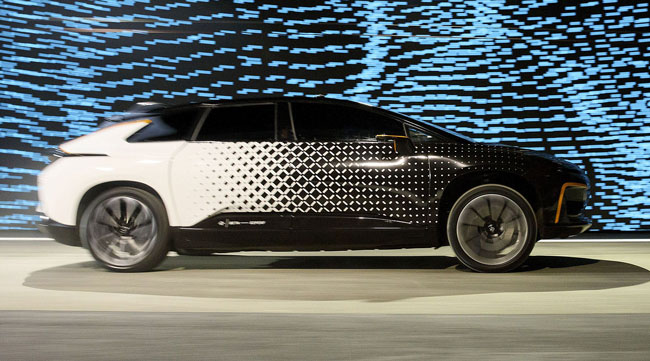
The Faraday Future FF91 electric car. (Patrick T. Fallon/Bloomberg News)
Faraday Future
Embattled EV startup Faraday & Future Inc. hopes to build a high-end, battery-electric SUV called the FF91. The company says its debut car will have three motors, can do more than 300 miles on a single charge and will have more than 1,000 hp.
Since unveiling the FF91 in 2017, Faraday has made little progress. Experienced automotive executive Carsten Breitfeld joined the company as CEO in October 2019, just weeks before Jia Yueting, Faraday’s founder, filed for bankruptcy in the U.S. after running up billions of dollars in personal debts trying to build a business empire in China. Since then, Faraday has struggled to raise the funds it needs to start production, even though Jia has settled with creditors.
The company has not disclosed pricing for the EV, but executives previously said it could cost as much as $150,000 and has been taking $5,000 refundable deposits. Breitfeld has said that the company seeks to raise $850 million, and that production on the FF91 can start within 12 months of securing funding. This month, Faraday named Zvi Glasman, former chief financial officer of Fox Factory Holding Corp., as chief financial officer.
Bloomberg News reported Faraday is in talks to go public with Property Solutions Acquisition Corp.
Lightning eMotors
Lightning eMotors combines commercial vehicle chassis, including some from Ford, with its own electric drive trains. The company, formerly called Lightning Systems, also provides charging infrastructure and services. Founder and CEO Tim Reeser said the company expects to reach annual production of 20,000 medium-duty commercial vehicles by 2025.
RELATED: Lightning eMotors Expands Manufacturing Footprint
Lightning eMotors agreed in December to go public through a merger with GigCapital 3 Inc., a blank-check company, confirming an earlier Bloomberg report. The transaction is expected to close in the first half of the year.
Bollinger Motors
Bollinger Motors is one of a number of automotive companies racing to bring a battery-electric pickup to market. The company said its B2 pickup has 614 hp and can do at least 200 miles of range on a single charge. It also plans to build an electric SUV, but has not yet secured a third-party manufacturer to build the vehicles.
RELATED: Bollinger Plans All-Electric Delivery Van
The Oak Park, Mich., outfit is small, with only 44 employees. In October, Bollinger told Bloomberg News it had secured 1,000 reservations for the cars with a $1,000 deposit attached to each.
The company’s founder and namesake, Robert Bollinger, has said he’s turned down a number of SPACs, which he declined to identify. Bollinger said he wants to first secure production partners before entering a SPAC agreement, as he believes it will raise the value of his company before he sells a stake. Bollinger estimates his firm needs $50 million to finish engineering work and an additional $250 million to get the vehicles to production.
AEye
The universe of new mobility doesn’t end with electric carmakers. AEye Inc. makes lidar for autonomous vehicles. The company’s sensor technology — which can detect vehicles up to about 984 feet away — has evolved from work that founder and Chief Technology Officer Luis Dussan did developing systems for fighter jets. The Dublin, Calif.-based company’s investors include Kleiner Perkins, LG Electronics, Intel Capital and Airbus Ventures.
Bloomberg News reported on Jan. 14 that AEye is in talks to go public through a merger with CF Finance Acquisition Corp. III, a Cantor Fitzgerald LP blank-check firm.
Proterra
Proterra Inc., a maker of battery packs and electric buses, is focused on transitioning commercial vehicles to clean energy platforms. To date, the company said it has sold more than 1,000 electric buses across North America, and produced and delivered more than 300 megawatt-hours of battery systems. Proterra said it had sales of $193 million in 2020.
RELATED: Proterra Gets $200 Million From Private Equity Firms
Proterra has agreed to go public through a merger with ArcLight Clean Transition Corp. The transaction is expected to close in the first half of the year and is subject to shareholder approval. Proterra’s CEO Jack Allen has said a SPAC deal allows the company to move faster and accelerate investments in its core business areas.
Ouster
Ouster Inc., which provides digital lidar sensors, works with software firms to power the technology behind autonomous driving. Its partners include Cognata and France’s Outsight SA.
Ouster agreed late last year to a merger with blank-check firm Colonnade Acquisition Corp. It is valued at about $1.9 billion including debt in the transaction, which is expected to close in the first half of the year. Its rivals, Luminar Technologies Inc. and Velodyne Lidar Inc., also went public through merging with SPACs last year.
Want more news? Listen to today's daily briefing:
Subscribe: Apple Podcasts | Spotify | Amazon Alexa | Google Assistant | More


